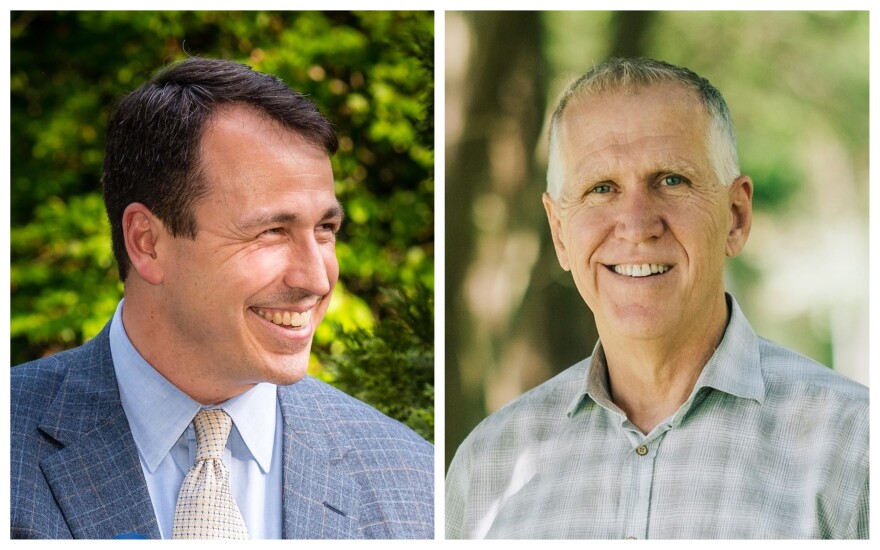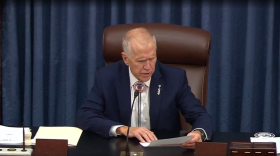Republican U.S. Senator Thom Tillis and Democratic challenger Cal Cunningham squared off Tuesday night in the second of their three debates, and questions about the potential successor to late Supreme Court Justice Ruth Bader Ginsburg hung heavy over the debate.
Preparations for the political fight over Ginsburg’s successor brought a new acuity to the differences between Cunningham and Tillis in the closely watched race.
Democrats need to flip four seats to ensure chamber control. The North Carolina Senate race has attracted the most outside campaign spending of any federal race this year save for the presidential campaign, with $65 million targeting the two candidates already for the general election, the Center for Responsive Politics said.
Cunningham and Tillis met in a Raleigh television studio for their second debate in as many weeks but the first since the death of Ginsburg at 87. At issue in their meeting was the timing of a new appointment to the nation's highest court and the legal philosophy of Trump's expected nominee.
Here are three takeaways from the second bout between Tillis and Cunningham.
Supreme Court nomination took center stage
The first topic was the one on everyone’s mind: The partisan fight over whether President Donald Trump should try to replace Ginsburg’s seat on the Supreme Court before the election.
Out of the gate, Cunningham attacked Tillis for saying said he’d vote for whoever Trump names, even before there’s a nominee. It was the first of many attempts by the Democrat at trying to paint the incumbent as a serial capitulator to partisanship and special interests.
“There is an important role for a United States Senator as a check and balance on the President of the United States. Rather than act as a check and balance, Senator Tillis has written a blank check to the President,” Cunningham said. “He has forfeited his right to independence of judgement here on behalf of the people of our state.”
Cunningham said during the debate that he would not support expanding the Supreme Court. Said Ginsburg said 9 is the right number and he agrees. #ncpol
— Brian Murphy (@MurphinDC) September 23, 2020
Tillis, a Judiciary Committee member, has quickly aligned himself with Trump and Senate Majority Leader Mitch McConnell, telling Trump rally participants in Fayetteville last weekend that he would vote to confirm any of the candidates on Trump’s list.
Tillis said Tuesday that, as a member of the Senate Judiciary Committee, he's already familiar with the potential nominees — including North Carolina native Allison Jones Rushing — and they're on a list that Trump has made public. Then he took one of several shots during the debate at trying to tie Cunningham to Joe Biden. He noted that the Democratic Presidential candidate, who Tillis referred to as Cunningham’s running mate, had declined to produce a similar Supreme Court short list.
“Joe Biden is ducking the question. Cal Cunningham is supporting Joe Biden,” Tillis said. “We all know that they're going to be radical left judges who will vote against the second amendment, that will vote for keeping our schools and our and our businesses shut down.”
Trump has said he would his announce his choice Saturday. Confirmation hearings could begin next month.
“President Trump deserves to send forth a nominee and I intend to hear them in (the) Judiciary Committee and then move for passage on the floor,” Tillis said.
So far, Tillis has pretty much gone Full Trump. Cunningham meanwhile has been hitting him back for not acting in a bipartisan way to get things done. Red meat vs. nourishing veggies.
— Charles P. Pierce (@CharlesPPierce) September 22, 2020
Marijuana legalization discussed
Both offered muted positions on legalizing marijuana. Tillis said he had long supported research into its therapeutic use going back to his time in the state legislature. But for him, it's still too soon to legalize it in North Carolina.
Cunningham advocated for the removal of marijuana from the federal controlled substances schedule. He added that if a state chooses to legalize marijuana, it should be regulated similar to the way alcohol is. If legalized in North Carolina, it should be tightly regulated, Cunningham said.

A recent poll from WGHP and Emerson College shows that the majority of North Carolinians – 72.5% – support the legalization of marijuana for medical use. And 48.1% of people in the state think it should be legalized for recreational use.
Both Cunningham and Tillis said they had smoked marijuana when they were younger.
“Yes, when I was a kid,” Tillis offered as an explanation. “I was growing up in a trailer park.”
Other heated exchanges
There were few fireworks as Cunningham and Tillis wrangled over other topics including how to deal with the rising national debt, police reform, COVID-19 relief legislation, healthcare and border security.
Responding after Tillis was the aggressor in last week's debate, Cunningham gave out more verbal jabs on Tuesday. The Iraq War veteran and Raleigh attorney accused Tillis of failing to come through in his first term on solutions to the immigration system and to the national debt. He said Tillis wrongly accused him of supporting Medicare for All, saying he actually supports building upon Obama's 2010 federal health care law. Tillis, meanwhile, has voted to repeal the Affordable Care Act, according to Cunningham, and offered no credible replacement.
“He went to Washington and he's failed to deliver,” Cunningham said, adding that Tillis “capitulated to the partisan forces within his own party."
#NCSenateDebate | Tillis attacks Cunningham on healthcare politics pic.twitter.com/kLieIq4YoE
— WSPA 7News (@WSPA7) September 22, 2020
Tillis continued to accuse Cunningham of breaking promises and raising taxes during his short stint in the state legislature almost 20 years ago, He argued Cunningham would give in to the liberal policies of Senate Minority Leader Chuck Schumer, who has help raised money to support Cunningham, if Democrats win a majority.
It “sounds like Chuck Schumer's investing in a rubber stamp when you get up to Washington,” Tillis said.
On recent unrest in cities, Cunningham said he was against sending in federal troops to quell disturbances. Tillis said they should be brought in at a governor's request. Cunningham said North Carolina's Fort Bragg, named for a Confederate general, should be renamed. Tillis said local residents and people who serve on installations should help make renaming decisions.
An Associated Press photographer was the only outside journalist allowed inside the debate studio. Others were barred from watching the debate in-person, which aired on several Nexstar stations, due to safety concerns from COVID-19.
The candidates meet for a third and final televised debate on Oct. 1.
WUNC Digital Producer Mitchell Northam contributed to this story.








